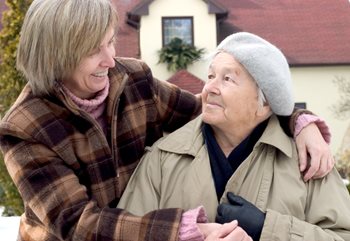Healthy Living
Cold-Weather Care for People with Cancer
Cold winter weather can be uncomfortable, but for people undergoing cancer treatment, it can present some serious challenges.

Wilmot Cancer Institute nurses Cassie Adams and Karen Abbas offer their insights on the risks cancer patients face and some tips to stay safe this winter.
Hypothermia: Side effects of treatment such as dehydration, fatigue and anemia can make you more sensitive to the cold and more susceptible to hypothermia. Hypothermia is a condition in which your body loses heat faster than it can produce heat, dangerously lowering your temperature.
Some kinds of chemotherapy, such as oxaliplatin, can also cause extreme sensitivity to the cold and lead to breathing problems as well as hypothermia.
Frostbite: At the other end of the spectrum, sometimes chemotherapy can make you less sensitive to the cold. It can cause a condition called peripheral neuropathy that decreases sensation in your hands and feet. Peripheral neuropathy can make it difficult to feel how cold it is, and it can put you at risk for frostbite, an injury caused by the freezing of the skin and underlying tissue.
Falls: Neuropathy can also make you unsteady on your feet, even when there’s no snow or ice. And while falls can be dangerous for anyone, people who have a condition called thrombocytopenia should be especially careful. Patients with blood cancers such as leukemia or lymphoma are at particular risk for this condition, in which there is a lower than normal amount of platelets in the blood. Platelets help blood clot, and having too few of them can lead to bruising or serious bleeding with an injury.
Some tips to help keep you safe this winter:
- Dress in warm layers. Wrap a scarf around your nose and mouth before you head out into the cold to avoid any breathing problems.
- Wear a hat that covers your ears, and put on heavy gloves or mittens to protect your fingers.
- Wear shoes or boots with good treads.
- Make sure walkways are cleared of snow and ice.
- If you can’t avoid walking in the snow, walk like a penguin. Take flat-footed, short steps or shuffle for stability. Keep your arms at your sides (not in your pockets) to maintain your balance.
- Ask for — and accept — help with shoveling snow or running errands so you can avoid going out in inclement weather.
Cassie Adams, RN, is an assistant nurse manager at Wilmot Cancer Institute's Pluta Cancer Center in Henrietta.
Karen Abbas, MS, RN, AOCN, NPD-BC, is a nurse educator at Wilmot Cancer Institute.


